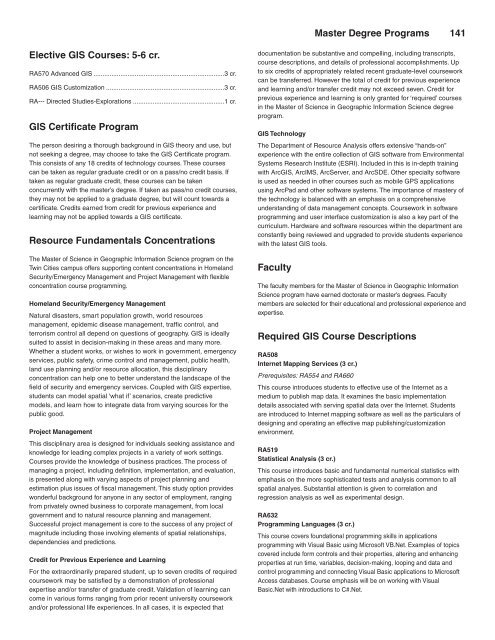& Student Handbook - Saint Mary's University of Minnesota
& Student Handbook - Saint Mary's University of Minnesota
& Student Handbook - Saint Mary's University of Minnesota
You also want an ePaper? Increase the reach of your titles
YUMPU automatically turns print PDFs into web optimized ePapers that Google loves.
Master Degree Programs 141<br />
Elective GIS Courses: 5-6 cr.<br />
RA570 Advanced GIS .........................................................................3 cr.<br />
RA506 GIS Customization ..................................................................3 cr.<br />
RA--- Directed Studies-Explorations ...................................................1 cr.<br />
GIS Certificate Program<br />
The person desiring a thorough background in GIS theory and use, but<br />
not seeking a degree, may choose to take the GIS Certificate program.<br />
This consists <strong>of</strong> any 18 credits <strong>of</strong> technology courses. These courses<br />
can be taken as regular graduate credit or on a pass/no credit basis. If<br />
taken as regular graduate credit, these courses can be taken<br />
concurrently with the master’s degree. If taken as pass/no credit courses,<br />
they may not be applied to a graduate degree, but will count towards a<br />
certificate. Credits earned from credit for previous experience and<br />
learning may not be applied towards a GIS certificate.<br />
Resource Fundamentals Concentrations<br />
The Master <strong>of</strong> Science in Geographic Information Science program on the<br />
Twin Cities campus <strong>of</strong>fers supporting content concentrations in Homeland<br />
Security/Emergency Management and Project Management with flexible<br />
concentration course programming.<br />
Homeland Security/Emergency Management<br />
Natural disasters, smart population growth, world resources<br />
management, epidemic disease management, traffic control, and<br />
terrorism control all depend on questions <strong>of</strong> geography. GIS is ideally<br />
suited to assist in decision-making in these areas and many more.<br />
Whether a student works, or wishes to work in government, emergency<br />
services, public safety, crime control and management, public health,<br />
land use planning and/or resource allocation, this disciplinary<br />
concentration can help one to better understand the landscape <strong>of</strong> the<br />
field <strong>of</strong> security and emergency services. Coupled with GIS expertise,<br />
students can model spatial ‘what if’ scenarios, create predictive<br />
models, and learn how to integrate data from varying sources for the<br />
public good.<br />
Project Management<br />
This disciplinary area is designed for individuals seeking assistance and<br />
knowledge for leading complex projects in a variety <strong>of</strong> work settings.<br />
Courses provide the knowledge <strong>of</strong> business practices. The process <strong>of</strong><br />
managing a project, including definition, implementation, and evaluation,<br />
is presented along with varying aspects <strong>of</strong> project planning and<br />
estimation plus issues <strong>of</strong> fiscal management. This study option provides<br />
wonderful background for anyone in any sector <strong>of</strong> employment, ranging<br />
from privately owned business to corporate management, from local<br />
government and to natural resource planning and management.<br />
Successful project management is core to the success <strong>of</strong> any project <strong>of</strong><br />
magnitude including those involving elements <strong>of</strong> spatial relationships,<br />
dependencies and predictions.<br />
Credit for Previous Experience and Learning<br />
For the extraordinarily prepared student, up to seven credits <strong>of</strong> required<br />
coursework may be satisfied by a demonstration <strong>of</strong> pr<strong>of</strong>essional<br />
expertise and/or transfer <strong>of</strong> graduate credit. Validation <strong>of</strong> learning can<br />
come in various forms ranging from prior recent university coursework<br />
and/or pr<strong>of</strong>essional life experiences. In all cases, it is expected that<br />
documentation be substantive and compelling, including transcripts,<br />
course descriptions, and details <strong>of</strong> pr<strong>of</strong>essional accomplishments. Up<br />
to six credits <strong>of</strong> appropriately related recent graduate-level coursework<br />
can be transferred. However the total <strong>of</strong> credit for previous experience<br />
and learning and/or transfer credit may not exceed seven. Credit for<br />
previous experience and learning is only granted for ‘required’ courses<br />
in the Master <strong>of</strong> Science in Geographic Information Science degree<br />
program.<br />
GIS Technology<br />
The Department <strong>of</strong> Resource Analysis <strong>of</strong>fers extensive “hands-on”<br />
experience with the entire collection <strong>of</strong> GIS s<strong>of</strong>tware from Environmental<br />
Systems Research Institute (ESRI). Included in this is in-depth training<br />
with ArcGIS, ArcIMS, ArcServer, and ArcSDE. Other specialty s<strong>of</strong>tware<br />
is used as needed in other courses such as mobile GPS applications<br />
using ArcPad and other s<strong>of</strong>tware systems. The importance <strong>of</strong> mastery <strong>of</strong><br />
the technology is balanced with an emphasis on a comprehensive<br />
understanding <strong>of</strong> data management concepts. Coursework in s<strong>of</strong>tware<br />
programming and user interface customization is also a key part <strong>of</strong> the<br />
curriculum. Hardware and s<strong>of</strong>tware resources within the department are<br />
constantly being reviewed and upgraded to provide students experience<br />
with the latest GIS tools.<br />
Faculty<br />
The faculty members for the Master <strong>of</strong> Science in Geographic Information<br />
Science program have earned doctorate or master's degrees. Faculty<br />
members are selected for their educational and pr<strong>of</strong>essional experience and<br />
expertise.<br />
Required GIS Course Descriptions<br />
RA508<br />
Internet Mapping Services (3 cr.)<br />
Prerequisites: RA554 and RA660<br />
This course introduces students to effective use <strong>of</strong> the Internet as a<br />
medium to publish map data. It examines the basic implementation<br />
details associated with serving spatial data over the Internet. <strong>Student</strong>s<br />
are introduced to Internet mapping s<strong>of</strong>tware as well as the particulars <strong>of</strong><br />
designing and operating an effective map publishing/customization<br />
environment.<br />
RA519<br />
Statistical Analysis (3 cr.)<br />
This course introduces basic and fundamental numerical statistics with<br />
emphasis on the more sophisticated tests and analysis common to all<br />
spatial analyes. Substantial attention is given to correlation and<br />
regression analysis as well as experimental design.<br />
RA632<br />
Programming Languages (3 cr.)<br />
This course covers foundational programming skills in applications<br />
programming with Visual Basic using Micros<strong>of</strong>t VB.Net. Examples <strong>of</strong> topics<br />
covered include form controls and their properties, altering and enhancing<br />
properties at run time, variables, decision-making, looping and data and<br />
control programming and connecting Visual Basic applications to Micros<strong>of</strong>t<br />
Access databases. Course emphasis will be on working with Visual<br />
Basic.Net with introductions to C#.Net.
















